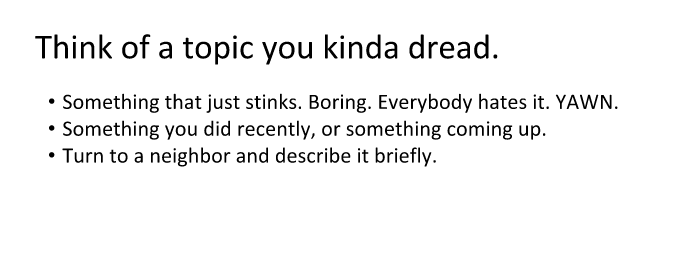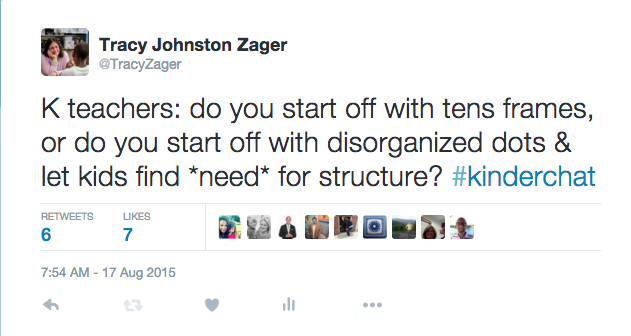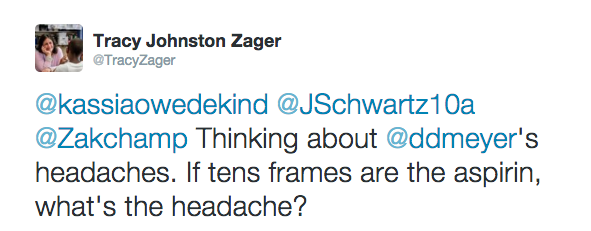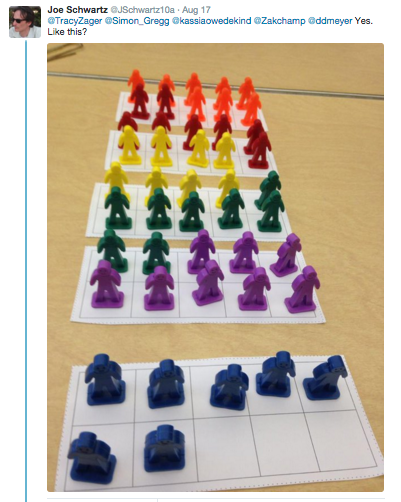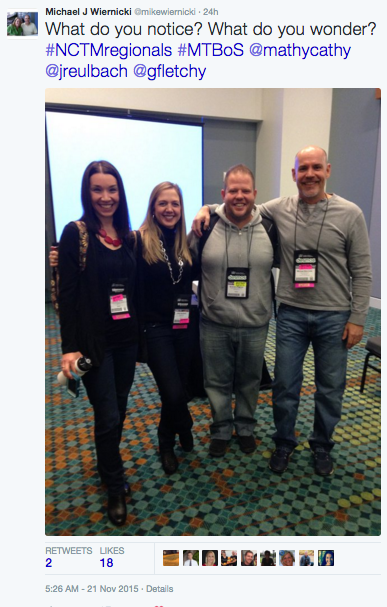I’m starting to bounce back from conference week. I love it every year and this one was no exception. I’m still processing (and digging out from emails), but there’s one thought I need to share now.
Every year there’s a certain amount of soul searching among the folks in the Math Twitter Blog-o-Sphere (#MTBoS) about our role and relationship to our professional guilds. People talk about conferences and communication and membership and journals and the future. All understandable, and a good conversation to have. I agree with some, disagree with others, enjoy listening in. No sweat. Something Michael Pershan said on Dylan’s blog has stayed with me, however, and made me really uncomfortable:
I’ve started wondering if being in the MTBoS is sort of like being a fan. To be in the MTBoS means that you love Three Acts, Which One Doesn’t Belong, Talking Math With Your Kids, Estimation 180, Problem-Based Stuff, Max Ray-Riek, Tracy Zager, Desmos or something.
To be fair to Michael, the next sentence was:
[Is this a good time to remind you that I’m making stuff up and have no reason to believe ANY of this with much confidence? I think it is.]
Ha! I appreciate that Michael tossed his idea out there so we can think about it. Because if he’s thinking it, others probably are too. And I get where it comes from, I think. Mostly. Maybe? I mean, there’s this “cool kids” thing that happens that I can’t stand. So that’s part. And then there are also the amazing resources made by people in the community, (WODB, visual patterns, #3Actmath, Estimation 180, etc.), which many people use and promote. True.
But for me, the MTBoS is not at all about fandom. It’s a community where people who love teaching math and thinking about teaching math can congregate. It’s a place to find like-minded folks, but also dissent. It’s a place where we can make our ideas better by listening to others, putting our work out there, and asking for feedback. It’s a supportive space where some genuine, deep friendships and collegial relationships are born and maintained. It has norms that matter–openness, inclusiveness, camaraderie–even though nobody is officially moderating for those norms. (That’s amazing, if you think about it.) For me, MTBoS is the only place on the internet where the comments are overwhelmingly constructive, and worth reading. It’s not about any one person or group of people. It’s a community, not a cult of personality.
What’s my evidence? There are so many choices (Twitter Math Camp, Global Math Department, every day online), but my recent focus was #MTBoSGameNight. It’s a zany idea, something a few of us hatched before Boston. The idea was to create a way to meet our online community members face-to-face at the close of NCSM and the kickoff of NCTM. We have no budget, no sponsor, no organizing committee. All I do is organize a few logistics and make a slide inviting anyone who wants to come.
Our first year, we had something like 40-50 people? I don’t know. Our second year, we were over 100. This year, 200-250. Matt Larson, as President of NCTM last year, asked how NCTM could help. He asked how could we make sure people could go both to the MET gala and Game Night? Given that Game Night is something the members want to do, what institutional support do we need? This year, NCTM provided the venue and a cash bar. So appreciated.
The night before Game Night, I was talking to Graham Fletcher in a bar and he asked what he could do. I told him I’d love a clever way to give away door prizes. He texted me the next morning. “Where’s the box of books? I’m on it.” He, Zak Champagne, and Mike Flynn set up a series of estimation challenges about them. Now we needed A/V, so Stenhouse helped out there. I arrived at the space 15 minutes before. It was a brightly lit hotel conference ballroom. Muzak was playing. The bartender was drifting around aimlessly. I thought, “This is not going to work.” Nothing about it felt like a party.
And then the people came. Christopher Danielson put his wonderful mathy playthings on every table. People started introducing themselves to each other. Drinks started flowing and the bartender started grinning.
My friend and fellow Mainer, Sarah Caban, came up to me and told me she had an idea. The game she brought was a Rock, Paper, Scissors tournament. Would it be OK if she explained it to everyone? Of course. She got a gaggle of demonstrators, grabbed the mic, and off she went:
http://https://www.youtube.com/watch?v=9Huv0v6iAFw&feature=youtu.be
Play escalated quickly:
http://https://youtu.be/CqKqwPlQmfw
Until the final, glorious climax:
To me, this is the wonder and worth of MTBoS. Somebody has an idea, other people are game to try it, everyone else has a good attitude, and we make stuff (moments, memories, play, thinking, resources) together. Honestly, I felt such an outpouring of love for all these people at this moment. It was the highlight of my conference week.
I don’t see fandom here. Rock, paper, scissors was Sarah’s brainchild, and it was her first game night. She joined twitter about a year ago. The rock, paper, scissors finalists were not Dan Meyer and Andrew Stadel. They were two women I’d never met before. I hope our winner will remember what it felt like to have all those math teachers at her back, chanting, “Dana! Dana! Dana!” Because to me, that’s what we do every day. We have each other’s backs. We cheer each other on. We share our passion for this work, and our ideas, and our energy.
Sign me up to be a fan of that.
First time for me (and lots) at face to face MTBoS event and i felt very welcomed. TY to all for wotking hard at that. #mtbos
— LeeanneBranham (@LeeanneBranham) April 7, 2017
I’m pleased to say Matt and I have institutionalized this event going forward. #MTBoSGameNight will continue to be hosted by NCTM. That may sound like a small thing, but it’s not. From where I sit, the merger with The Math Forum, the emphasis on #MTBoS representation on all NCTM committees, the MTBoS keynote in Nashville, and the support of our fringe events like Game Night and ShadowCon are meaningful. I’m all for pressing NCTM to be what we need it to be. But I’m also all for recognizing the big shifts made over the last few years. Change comes faster within the (unstructured, unregulated) #MTBoS than it can within the (highly structured, institutionalized) NCTM, just by the nature of the beasts. But good change is happening nonetheless.



